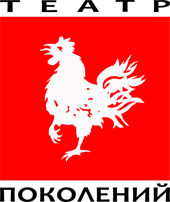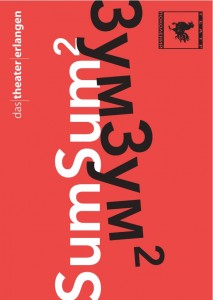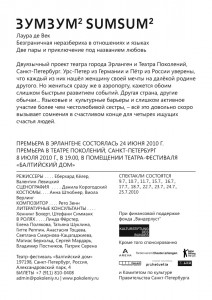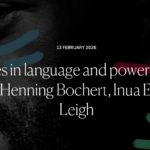SumSum² – a borderless confusion of love and language
a bilingual coproduction of Theater Erlangen and Teatr Pokoleniy with the Baltiskiy Dom and raum4.




funded by Fonds Wanderlust der Bundeskulturstiftung and Pro Helvetia.

>>> more information at http://www.raum4.org/sumsum (production blog, impressions, videos, etc.)
In 2008, Eberhard Köhler of raum4 developped the idea of a German-Russian collaboration with the Teatr Pokoleniy from St. Petersburg/Russia, with which he had been working as a director for several years already, and together with Henning Bochert, they worked the idea up to a concept and approached several theaters for collaboration. The designated artistic director of Theater Erlangen, Katja Ott, was immediately enthused by the plan. Together, raum4 and Theater Erlangen explored the possibilities to collaborate and finally applied for funding fort he project SumSum2 project with the Wanderlust Fund of the German Cultural Foundation.
During that time, raum4 managed to have the translation for the special bilingual version completed through the translator Galina Klimowa with funding from Pro Helvetia.
After the application with the Wanderlust Fund was indeed been accepted in January, preparations are now proceeding with high speed.
The Plan
In order for the two theaters may get to know each other thoroughly, at first we will produce SumSum, the newest play by Swiss playwright Laura de Weck, in a bilingual, intertwined format. Two partial productions will be rehearsed with two German-Russian ensembles at both cities, and they will be wrought toogether into a signle performance first in Erlangen and subsequently also in Eberhard Köhler and Henning Bochert contribute the idea and concept.
As a second step and based on the experience with the first one – a mutual excahnge of staff over the period of several months will deepen the collaboration and communicate the respective fortes between the two theaters. We particularly consider exchanging artistic and technical staff. We hope that something of the visual, associative theatrical work of the russian theater will have a sustainable impact on Theater Erlangen even beyond the time of the cultural exchange. At the same time, we hope tha tthe technical level of the independent theater in Russia may be raised by the contact with the German workshops, security standards, organisational procedures etc. with a lasting perspective. We will device this exchange based on the experiences we made during the production of SumSum².
As a conclusion, one German and one Russian production will be performed at the partner theater in the respective other country as a guest performance.
THE PARTNER THEATER
Theater Erlangen
Theater Erlangen aims to collaborate with the St. Petersburg Teatr Pokoleniy (Theater of Generations). The latter has received larger attention nationally as well as internationally, recently. In November 2007, Teatr Pokoleniy was invited to the „Churer Theaterherbst“ in Switzerland, in autumn 2007 they were invited to Nižni-Novgorod, in April 2009 to Veliky Novgorod. In addition, the TV stations ARTE and ZDF Theaterkanal broadcast a report about Teatr Pokoleniy. theater heute magazine published an article in May 2009 about their productions of Antigone and Laura de Weck’s play Lieblingsmenschen. Teatr Pokoleniy’s repertoire comprises more than 10 plays now that are regularly shown.
Teatr Pokoleniy
Teatr Pokoleniy is an independent theater unter artistic direction of the Russian-American professor and stage designer Danila Korogodsky. Founded by his father, great Leningrad director and theater pedagogue Zinoviy Jaklovich Korogodsky, the young ensemble has been working for more than three years inside the spectacular vaults of the Peter and Paul fortress in the heart of historical St. Petersburg. The actors have been trained in a Stanislavski tradition that has been continued over three generations. Their very physical acting style is significantly different from that of actors trained in western Europe with their enhanced awareness for alienation and the making transparent of stage actions. Working in and with their different styles and approaches can be a magnificent challenge and a new experience particularly for the actors.
The infrastructure of the theater is quite modest. Each productions receives only very limited public funding, the theater itself none at all. Very modest fees are received from the box office. Nonetheless were the most recent productions able to receive considerable attention from the media (STOL in particular). The theater is a form hitherto unknown in Germany of freelance workers who are funded per production at best and still manage to operate a full performance schedule and a repertoire.
THE PLAY SUMSUM
Laura de Weck’s play has a very good sense of the rhythm of the language. This is achieved not only through the words spoken, but also very strong silent moments become a form of communication of a special sort. They are marked in the text like pauses in a musical composition.
The play SumSum (German premiere: LTT Tübingen, 3. Oct. 2008) tells the story of Urs-Peter, who got to know Selina „in the computer“. Together with his best friend, he discusses his plan to fly to Selina’s far away home country to meet her.
Urs-Peter is greeted at the airport by Selina and her sister. He soon finds that Selina doesn’t even speak his language – and her sister needs to translate everything. Now Urs-Peter has the choice between communicating with Selina through a third person – at the cost of any intimacy that might grow between the two strangers – or being alone with Selina – without a common language. In their new love, the two device means of expression of their own. But the relationship fails, and Urs-Peter flies back home.
Does love depend on culture, background, mentality of the Other? What is the part of language in searching for and finding love. Are the answers to these questions subject to country and people as well?
SumSum by Laura de Weck tells a story of cultural and lanugage barriers and thus ideally focusses in ist themes all interest and threads of our ideas for an exchange across country borders.
DIRECTORS Eberhard Köhler, Valentin Levitskiy
DRAMATURGY Henning Bochert (gesamt), Stefanie Symmank (Erlangen)
STAGE DESIGN Danila Korogodsky
COSTUME DESIGN von Quitzow (Anna Stübner, Viola Werling)
MUSIC/SOUND Reto Senn
CAST Linda Foerster, Yelena Polyakova (understudy: Tatyana Shuklina), Gitte Reppin, Anastasia Toshcheva (understudy: Svetlana Smirnova-Katsagadzhieva), Matthias Bernhold, Sergey Mardarh, Vladimir Postnikov, Patrick Serena



Leave a Reply